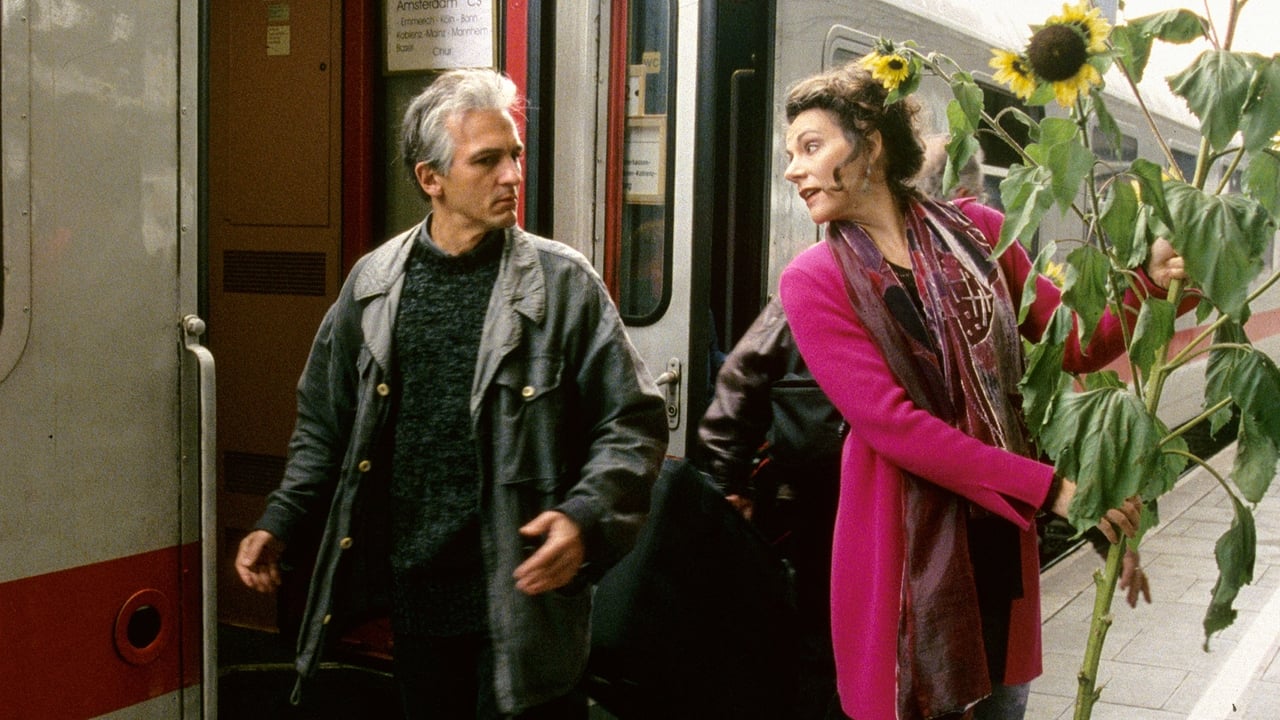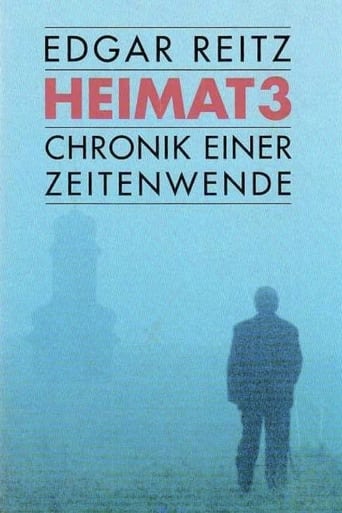Platicsco
Good story, Not enough for a whole film
Matialth
Good concept, poorly executed.
Invaderbank
The film creates a perfect balance between action and depth of basic needs, in the midst of an infertile atmosphere.
Tim Kidner
I need to point out that I've not seen Heimat 1, nor 2.However, I would say that with much recent changing history in Germany; the fall of the Wall, monetary unification and US military bases withdrawing, this hardly seems to matter, as it's all fairly fresh in the mind. We (us Brits) also view it all as slight outsiders as real people (well, fictionalised actors) are affected by those changes and that gives us a freshness, a keenness as another country's scenarios are new to us.I thought it would plod, be very proper and maybe a bit righteous. However, it was fresh, breezy and superbly presented with a vibrant colour and excellent sound. Acting too, is first rate.I found myself being swept along with the various characters involved, their almost normal activities keeping it real, but also compelling, as we can relate to their family and business issues. Then, a change of scene, location, and new people the story branches off and you enjoy that route. Cleverly, though, the sub-plots seem to relate or interlink with characters manifesting themselves just as you'd nearly forgotten them.If I recall, I viewed all of it just over a year ago, over one week. Though it changed its pace from thriller to intense drama, it was never boring. I wasn't riveted to all of it 100%, possibly one can't, with so much going on and human nature warms us to threads that hold particular interest to each of us differently.Naturally, I'd like to see the original, first and critically most acclaimed box set. This, the second and my third part are collector's items and expensive ones at that. Ones to show off to any knowing and adventurous movie/DVD collector. You'll be comforted in knowing that you're almost unique owning one, let alone having watched it all and even more than that, been thoroughly and decently entertained by it. Now, that IS a talking point...
Max_cinefilo89
Heimat: A Chronicle of Germany (1984), the first entry in Edgar Reitz's trilogy (although at the time he had no idea that was gonna happen), did not need a sequel. The Second Heimat: Chronicle of a Youth (1992), on the other hand, demanded one, because of its brilliant, ironic epilogue: having finally made love to Clarissa Lichtblau (Salome Kammer), Hermann Simon (Henry Arnold) realized he couldn't keep running away for ever and decided to return to Schabbach after a decade-long absence. During those ten years he'd been through a lot (including a failed marriage), yet when he came home his old friend Glasisch (Kurt Wagner), the village fool and narrator of the first Heimat series, greeted him by saying: "You haven't changed at all, little Hermann". Such a conclusion almost screams "Go on with the story, please", and with Heimat 3: Chronicle of a Turning Point, he returns to familiar ground for the third and last time.The story begins in November 1989, in Berlin, where Hermann is busy with a concert. During the night, he learns of the destruction of the wall that had been separating the two parts of Germany, and while trying to find out more he runs into Clarissa, 29 years after the night they spent together in Amsterdam. The two decide to settle down and buy a house in the countryside. Coincidentally, said building isn't that far away from Schabbach, where Hermann's brothers Anton and Ernst have to deal with some problems, which will affect the whole community, as well as Hermann's life too.As with the previous Heimat entries, Reitz handles the project incredibly well from a technical point of view, with beautiful cinematography (though there are less black and white segments this time), controlled editing and great music. In terms of plot and character development, though, Heimat 3 isn't as flawless as its predecessors. It may have to do with the fact that covering a ten-year period (1989-1999) in only six episodes isn't an easy task. There are huge chronological gaps between events, meaning that after the superbly executed first episode, the series'quality shifts: some people (mostly those the audience will relate to, like Russian immigrant Galina or East Berlin-based construction worker Gunnar) disappear inexplicably, while others come out of nowhere. The characters we're left with are largely annoying (Anton's son Hartmut and particularly Hermann's daughter Lulu), and it looks like the director's lost his interest in the leading couple as well (except for the eerie, Kubrick-inspired concert sequences). Fortunately, he redeems himself with the stunning final chapter (aptly titled Farewell to Schabbach), a touching and, in pure Heimat tradition, ambiguous goodbye to a universe that has struck and moved lovers of film and television alike throughout the years.On the whole, an underachievement compared to Heimat 1 and 2 (blame the dodgy middle section for that), but worth seeing as a completion of Reitz's powerful German saga.
didier-20
I've posted this comment on Heimat 3 after sitting through all the Heimats over the past 3 months. It is of course excellent cinema, perhaps there is no need to explain why, considering it's fame. I have one major criticism of the director's vision, The whole work is cleansed of minorities.I began to find this troubling about 2/3s of the way through Heimat 2. It struck me as an outrage that the bohemian "salon" & it's circle of bright young things in Munich in which Herman lived whilst a student was completely devoid of any gay representation. Unthinkable, considering it's exactly the sort of situation in which gay people would have been welcomed & to which they would have gravitated. I found this absence unforgivable by the end of Heimat 2. I got annoyed by the repeated variations of heterosexual love that were being depicted.There was a great injustice in this exclusion. I felt the same in Heimat 3 about ethnic minorities. Here, the film moves firmly into the familiar contemporary life of big cities. Berlin is a city of ethnic variation. As the film's main theme came to the fore like a great wave; namely the aim to reclaim back from fascism the right of Germans to consider what it means to be German and to celebrate that relationship of people to place, the absence of racial representation struck me as inherently suspect, even sinister. There were 2 very very brief images of black Americans as iconic emblems of 'other', of 'not us' therefore acceptable, even exotic, liberating. There was also a very brief image of a group of Indian boys silently working in a sweat shop. This last image is suspect, because Germans traditionally envied the idea of Britain's colonial empire & this image evokes a German simulation of a Raj they never had. At the very least the image feeds into the existence of that National envy. White ethnicity is covered. The proximity to the former USSR & former Eastern Europe provides characters who show us this European condition of multiple boundaries & how they contribute to ideas of national identity. But somehow it still portrays a localised preoccupation with notions of racial purity & belonging. That kind of thinking which is fundamentally blind to 'difference' is a cul de sac. I felt the director was somehow giving permission to think like this over & above questioning thinking of this kind. All the people who are given place in the story are essentially good people. They are liberal, kind, intelligent, angry feeling people. But they are all white & heterosexual & the patriarchal flows through their lives. Even the revolution of the sixties depicted the fury of the establishment liberal but failed to portray any minority. I found this unacceptable. It's the one tremendous flaw in this work & for me these absences are as huge as the trilogy itself. It distorts reality, and raises questions about subliminal fascism in what the director selects when posing this very big idea. Is the frustration of the Liberal German really it's failure to abandon a mental "homeland" that consists of traditional heterosexual whiteness ?
anthonylinden
A story as brilliantly told as the first Heimat...I did not think that would be possible, but this truly is a masterpiece...I want it on DVD!! I was 19, and at university as a fresher when the Berlin Wall fell - an event that, looking back, none of us ever thought would happen. The euphoria is captured as I remembered at the time. Then the football World Cup in 1990, Gunnar's marriage breakdown, Hartmut's clumsy attempts to usurp his father, through to the deaths of Anton and Ernst, the cancer suffered by Clarissa - all of these events can be related somehow to all our own experiences of the 1990s. That is why Heimat 3 ranks so highly - the director managed to get me to feel nostalgic for events that occurred so recently. In the years to come, these feelings will grow stronger and Heimat 3 will become even more poignant for me.

